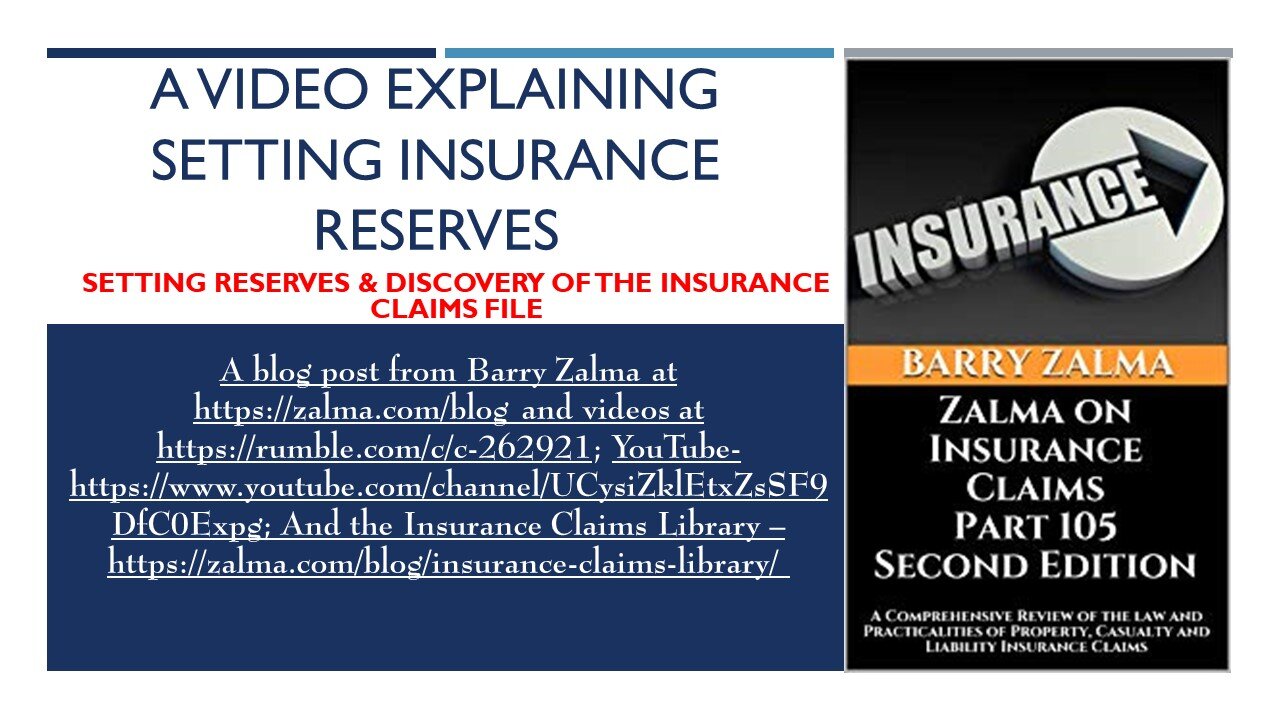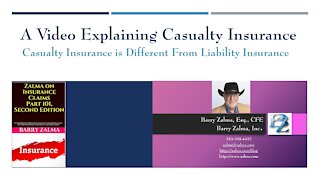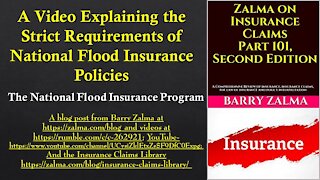Premium Only Content

A Video Explaining Setting Insurance Reserves
Setting Reserves & Discovery of the Insurance Claims File
The insurer is required to evaluate a claim based upon its merits, and without regard to policy limits. Eastham v. Oregon Auto Ins. Co., 542 P. 2d 895 (Or. 1975). The adjuster must determine the value of the claim without a thought to limits of liability in the policy and then compare the evaluation with the limits available.
Reserves should be set realistically and are recorded in the claim file. Reserves are the adjuster’s estimate of the potential recovery the claimant would receive from a jury. Reserves should be reviewed regularly, and revised if necessary. Failure to do so can be a factor in holding the insurer responsible for an excess verdict. Kunkle v. United Security, 168 N.W. 2d 723 (S.D. 1969). (For further assistance in setting reserves see Chapter 13, “Evaluation and Settlement.”) New York uses a definition of insurance reserves that can be used everywhere.
It defines insurance reserves as:
The referenced provision states that: every insurer shall . . . maintain reserves in an amount estimated in the aggregate to provide for the payment of all losses or claims incurred on or prior to the date of statement, whether reported or unreported, which are unpaid as of such date and for which such insurer may be liable, and also reserves in an amount estimated to provide for the expenses of adjustment or settlement of such losses or claims (Insurance Law Section 1303 [emphasis supplied]). Majewski v. Broadalbin-Perth Central School District, 91 N.Y. 2d 577, 696 N.E. 2d 978, 673 N.Y.S. 2d 966 (N.Y. 05/12/1998).
When presented with a challenge to discovery of insurance reserves information, the trial court is required to make a preliminary determination of whether the requested information is relevant in that it is admissible or is reasonably calculated to lead to the discovery of admissible evidence. In making a determination in the context of discovery about the relevancy of insurance reserves information, the trial court should take into account the nature of the case, the methods used by the insurer to set the reserves and the purpose for which the information is sought, and only grant requests for disclosure when its findings of fact and conclusions of law support a determination that the specific facts of the claim in the case before it directly and primarily influenced the setting of the reserves in question. [State ex rel. Erie Ins. Co. v. Mazzone, 625 S.E.2d 355, 218 W.Va. 593 (W. Va., 2005)]
© 2021 – Barry Zalma
Barry Zalma, Esq., CFE, now limits his practice to service as an insurance consultant specializing in insurance coverage, insurance claims handling, insurance bad faith and insurance fraud almost
equally for insurers and policyholders. He also serves as an arbitrator or mediator for insurance related disputes. He practiced law in California for more than 44 years as an insurance coverage and claims handling lawyer and more than 52 years in the insurance business. He is available at http://www.zalma.com and [email protected].
Mr. Zalma is the first recipient of the first annual Claims Magazine/ACE Legend Award.
Over the last 53 years Barry Zalma has dedicated his life to insurance, insurance claims and the need to defeat insurance fraud. He has created the following library of books and other materials to make it possible for insurers and their claims staff to become insurance claims professionals.
Go to the podcast Zalma On Insurance at https://anchor.fm/barry-zalma; Follow Mr. Zalma on Twitter at https://twitter.com/bzalma; Go to Barry Zalma videos at Rumble.com at https://rumble.com/c/c-262921; Go to Barry Zalma on YouTube- https://www.youtube.com/channel/UCysiZklEtxZsSF9DfC0Expg; Go to the Insurance Claims Library – https://zalma.com/blog/insurance-claims-library/ Read posts from Barry Zalma at https://parler.com/profile/Zalma/posts; and the last two issues of ZIFL at https://zalma.com/zalmas-insurance-fraud-letter-2/
-
 13:02
13:02
Barry Zalma, Inc. on Insurance Law
1 year agoMurder Pays
4401 -
 16:51
16:51
Barry Zalma, Inc. on Insurance Law
4 years agoA Video Explaining the Structure of Insurance
124 -
 15:47
15:47
Barry Zalma, Inc. on Insurance Law
4 years agoA Video Explaining Construction Defects and Insurance
42 -
 17:10
17:10
Barry Zalma, Inc. on Insurance Law
4 years agoA Video Explaining How insurance Fraud Cost Everyone
43 -
 16:42
16:42
Barry Zalma, Inc. on Insurance Law
5 years agoA Video Explaining Casualty Insurance
79 -
 17:00
17:00
Barry Zalma, Inc. on Insurance Law
4 years agoA Video Explaining the Three Major Responses to Insurance Fraud
134 -
 15:06
15:06
Barry Zalma, Inc. on Insurance Law
4 years agoA Video Explaining Voiding an Insurance Policy for Breach of Warranty
98 -
 16:05
16:05
Barry Zalma, Inc. on Insurance Law
4 years agoA Video Explaining the Strict Requirements of National Flood Insurance Policies
61 -
 18:06
18:06
Barry Zalma, Inc. on Insurance Law
4 years agoA Video Explaining the Equitable Remedy of Salvage and Insurance
125 -
 16:40
16:40
Barry Zalma, Inc. on Insurance Law
4 years agoA Video Explaining the Burden Imposed on a First Party Property Insurance Insured
190